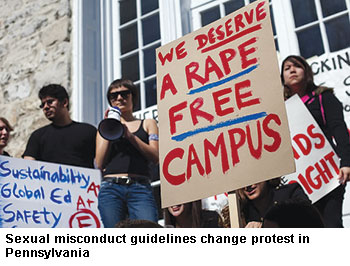United States – Campus sexual assaults debate
 Proposed changes to regulations on campus sexual misconduct in the US are a backward step in the fight against sexual violence and risk turning universities into court-rooms, according to observers. The planned Title IX rules, which were obtained by the New York Times, will narrow the definition of sexual harassment and hold universities accountable only for formal complaints and for conduct said to have occurred on their campuses. Universities would also be able to choose the “evidentiary standard” — preponderance of evidence — to apply in determining whether accused students are responsible for alleged misconduct, and decide whether to have an appeals process.
Proposed changes to regulations on campus sexual misconduct in the US are a backward step in the fight against sexual violence and risk turning universities into court-rooms, according to observers. The planned Title IX rules, which were obtained by the New York Times, will narrow the definition of sexual harassment and hold universities accountable only for formal complaints and for conduct said to have occurred on their campuses. Universities would also be able to choose the “evidentiary standard” — preponderance of evidence — to apply in determining whether accused students are responsible for alleged misconduct, and decide whether to have an appeals process.
Unlike the Obama administration’s guidelines — which ruled that mediation was not appropriate and told institutions to use the lower “preponderence of evidence” standard and to provide an appeals process — the new rules from the Department of Education would have the force of law and can be implemented without an act of Congress after a public comment period, according to the newspaper.
Jennifer Doyle, professor of English at the University of California, Riverside and author of Campus Sex, Campus Security (2015), describes the Obama-era guidelines as “balanced and fair”. She says that she is “wary of any policy that imagines that the university — which is itself an interested party — has the capacity to stage something like a criminal trial”.
The proposed changes will allow victims and their alleged assailants to request evidence from each other and to cross-examine each other. That kind of direct, adversarial interrogation is a feature of the courtroom — in which a judge enforces a set of rules governing just how that kind of questioning should be conducted, says Doyle. “University administrations are not neutral parties — there is a range of ways in which parties can interact with each other and with each other’s evidence,” she explains.
Jess Davidson, executive director of End Rape on Campus, a survivor advocacy organisation, says the changes are “a tacit endorsement of making campuses a safer place to commit sexual assault, rather than a safer place to learn free from violence”. “To require that assaults take place on campus in order to be investigated will shut out thousands of survivors who are assaulted off campus. To allow campuses to determine their own standard of evidence and whether or not to provide an appeals process is willfully ignorant, and will go back to a time when rape on campus was swept under the rug. To let survivors be cross-examined by a person who has violated them is downright cruel,” she adds.
Janet Napolitano, president of the University of California, says the changes would “undo six years’ worth of federal enforcement designed to strengthen sexual violence protections on college campuses”. But Meg Mott, professor of political theory at Marlboro College in Vermont, argues that the proposed changes “offer better support for victims of sexual assault”.














Add comment